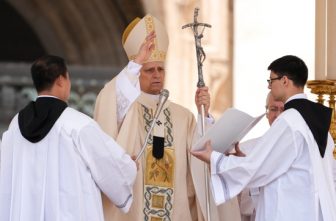St. Vincent Ferrer was born on January 23, 1350, in Valencia, Spain. His parents were William Ferrer, an Englishman, and Constantia Miguel, a Spaniard, both of noble families. He entered the Dominican Order at the age of seventeen and was sent to Barcelona where he studied philosophy and theology. He advanced quickly and at the age of twenty-one was sent to Lerida where he served briefly as a philosophy instructor (1371-1373).
 St. Vincent Ferrer was ordained to the priesthood in 1374 by Cardinal Pedro de Luna. He then moved to Barcelona where he continued his teaching, to Toledo for advanced theological studies, and back to Valencia in 1379 to serve as the prior of the Dominican friary.
St. Vincent Ferrer was ordained to the priesthood in 1374 by Cardinal Pedro de Luna. He then moved to Barcelona where he continued his teaching, to Toledo for advanced theological studies, and back to Valencia in 1379 to serve as the prior of the Dominican friary.
In the same year he also took a position on the staff of Cardinal de Luna, and they enjoyed a warm friendship. Cardinal de Luna was a papal elector and voted for Pope Urban VI who assumed the papacy in 1378, but Urban proved to be terribly unstable, the French cardinals and Cardinal de Luna contested the validity of his election, and later in 1378 elected Robert of Geneva as antipope, Pope Clement VII, thus beginning the Great Western Schism (1378-1417). In 1394 Cardinal de Luna succeeded Clement VII and took the name Benedict XIII. St. Vincent upheld the legitimacy of the antipopes in Avignon and gave them his ardent support.
Meanwhile, St. Vincent taught at the cathedral in Valencia from 1385-1390, and then served as the confessor of Queen Yolanda of Aragon. When Cardinal de Luna was elected antipope in 1394, St. Vincent was given a position on his staff, became the pope’s confessor, and was named the Master of the Sacred Palace, the pope’s personal theological consultant. Benedict XIII offered to promote him as a cardinal, but he refused. In 1398 he suffered a serious illness, and while recovering, had a vision of Jesus accompanied by saints Francis and Dominic, and received a call to go forth and preach penance. Benedict released St. Vincent from his positions so he could go forth as a missionary preacher.
St. Vincent traveled widely throughout Western Europe, from Spain to Italy, Switzerland, the Netherlands, and France, and back to Spain. He spent long hours in prayer before a crucifix in preparation. He challenged people to turn away from sin and do penance to be ready for the Last Judgment. His oratory was so vehement that he became known as the Angel of Judgment. He drew enormous crowds, so large that he often preached outdoors. His zealous ministry met with considerable success making numerous converts, most notably Bernadine of Siena and Margaret of Savoy, as well as thousands of Jews and Moors.
St. Vincent eventually came to see Pope Benedict’s papacy as a barrier to Church unity, approached his longtime friend, and pleaded with him to resign, but he refused. St. Vincent then approached King Ferdinand to withdraw his support of Avignon and Benedict, which he did in 1416, and Benedict’s papacy collapsed. The Council of Constance convened in 1417, Martin V became pope on November 21, 1417, and the Western Schism came to an end.
St. Vincent was exhausted from a lifetime of travel and diplomacy, moved to France, and spent his final three years in Normandy, and died in Vannes, Brittany, on April 5, 1419. He was canonized in 1455, and is the patron saint of construction workers and plumbers because he did so much to build the Church.




